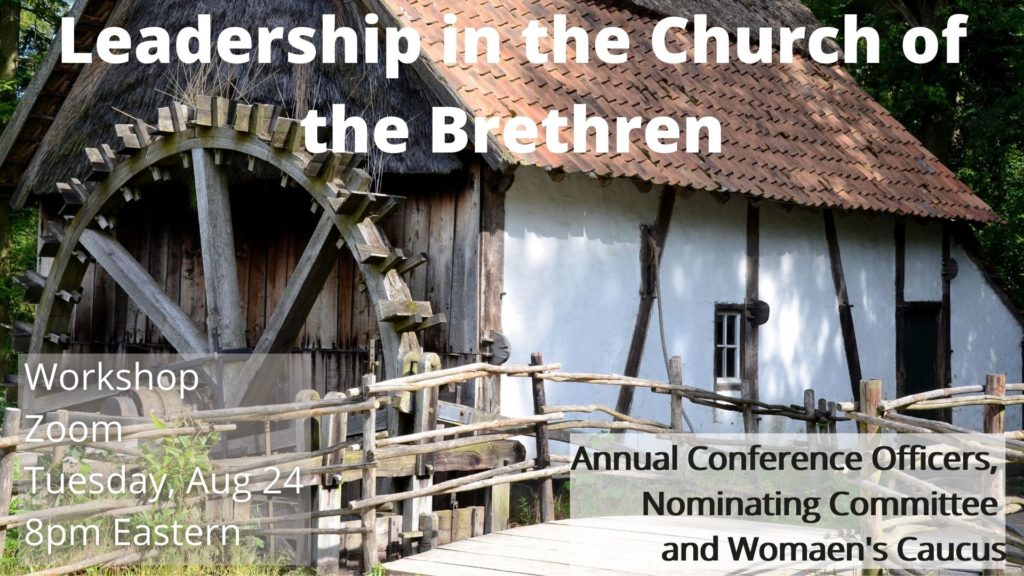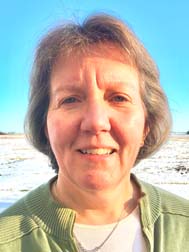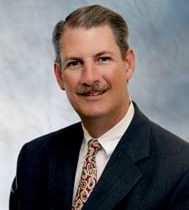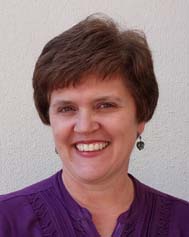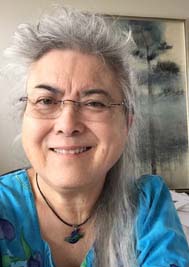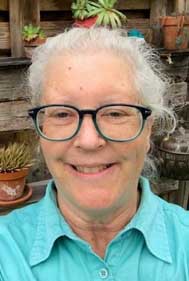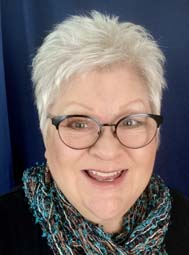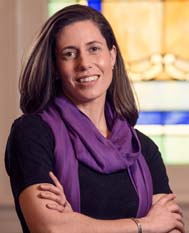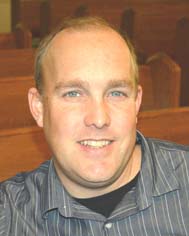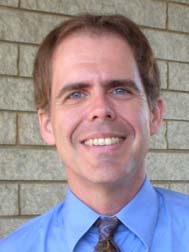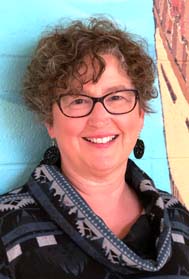Anna Lisa Gross: The position of moderator means intense leadership for a year with three years of influence. What do you believe are the most critical leadership needs within the denomination over the next three years?
Paul Liepelt: I’ve been surprised over the past couple of years. I have friends all over the spectrum in Church of the Brethren and it seems like nobody is feeling like their voices are heard right now. It’s from all sides of every question, which is kind of astounding to me. So for me, it’s helping people that don’t feel heard to be heard. To be intentional about seeking out those that really haven’t been sought out before and really been listened to. And then trying to help to give them a voice in the broader body.
What is the role of the moderator’s voice and action in responding to that need for listening?
One of the things that I would love to do–and this is not to be critical to previous moderators–but one of the things that I’ve seen is that typically, moderators go to the big churches in each district, because that’s sort of what’s easiest. And that’s what’s been done. And typically, the bigger churches have more influence. If it were me, I love to go to the smaller churches, I’d love to listen to those who really don’t get a lot of attention, normally, and might be feeling on the outskirts. And then hopefully helping to guide some of the conversations of the Mission & Ministry Board and all the different organizations, in a way that reflects how people are feeling and I think ultimately, that’s sort of what the moderator should be.
What resources do you bring to this work? What additional leadership resources are needed for the denomination to fulfill its mission?
I love hearing people’s stories, that’s why I’m in ministry. I love just getting to know people, getting to know their stories. I think that a lot of those pastoral skills play into that. I get along better with the people that aren’t like “churchy” people, that are kind of feeling like they’re already on the outskirts. Hopefully being somebody that’s approachable and not “up here” that people don’t feel that they can talk to.
And additional resources for the broader church right now? That’s a really hard question. That’s probably the hardest question you’ve asked. I would hope that all staff members would be doing some kind of intentional listening and David Steele did have a listening tour as part of the first couple of years as General Secretary. But keeping that going is critically important right now. And also, one of the things we’ve seen in the past couple years in the Mission & Ministry Board was a lot of churches have just stopped giving. There’s a lot of assumptions about why. But really, it’s a combination of churches that are just not financially viable anymore and can’t contribute, to churches that don’t feel like they’re being heard. So now they’re withholding funds from the whole denomination, as kind of a last-ditch effort to get some attention to say, “Hey, we need you to listen.” So I would love to see the church do more about reaching out to those churches that don’t contribute anymore, and aren’t really participating anymore. Just to hear why and what we can do to help. You know, if they’re struggling financially, what can we do to help them, what resources we could bring them.
Tell us more about being part of subcultures, such as bikers.
I love when people’s faith and their passions collide, and I think that makes some pretty interesting people. I love the biker community. They make fun of me at work [motorcycle dealership is one of Paul’s jobs]–when the old crusty bikers, you know, who have skin like leather and have been riding in the sun for 40 years–I just love them. I love these people. For me at work, it’s interesting: a lot of people didn’t know that I was a pastor at first. It wasn’t something that I advertised, and I intentionally did not really let them know that. And then an opportunity came up: we had somebody that worked with the dealership pass away. And I was able to do his funeral. Everybody figured out real quick, I was a pastor. And these old crusty bikers, when something is going on in their life, they’re not going to go to a church, they’re not going to ask a pastor for prayer, but they want me to pray for them. And I have permission at the dealership to go to the backroom and pray for them. It makes for some really interesting interactions.
But subculture in general is just these groups of people that are passionate about something–gardening or quilting or anything. And it gives you an opportunity to speak to somebody in their own language. And when you can do that, you have a really powerful opportunity.
My wife and I were missionaries in Nigeria. I was involved in the motorcycle culture in Nigeria and had a motorcycle there. But we got to know the achaba drivers at the time. Now achabas are illegal because of Boko Haram and there’s different elements to that. But the achabas were like the motorcycle taxis and elsewhere in Nigeria, there was a lot of Christian-Muslim divide. But within the achaba community, the Muslims and Christians were just both achaba drivers and like achaba was achaba. And they would talk to each other. They’re interacting because of this common thing that they did together. A friend and I started a ministry working on motorcycles, we could build relationships within the achaba community.
Tell us about a time you have lived as a minority, not a week-long workcamp, something more significant than that.
Nigeria would be like the best example of that, because for quite a portion of time, my wife and I were the only people who had white skin for like 10 hours around us. But that’s a hard question to answer because, yes, we were in the minority. But we were in the minority with privilege, which is a very different minority experience. I can’t think of too many occasions when I have been in the minority that has denied me privilege. So it’s two very different conversations. We got married in Nigeria, we had these major life events there and doing all of that in a different culture that you’re not used to…there was a big learning curve and there was also a lot of mistakes in that so it kind of helps to breed humility because you’re going to mess up, you’re going to say things wrong. You’re going to hurt people’s feelings and have to go and apologize. It’s definitely a humbling experience.
Tell us about your decision to resign from Mission & Ministry Board and how you intend to return to MMB if elected moderator.
It’s hard to explain and it’s and it’s and it’s winding to explain. I’m speaking for myself. I’m not speaking for the board, I’m speaking from my perspective. I feel like Mission & Ministry Board made a mistake when they adopted the new Strategic Plan. The new Strategic Plan is built on the Compelling Vision, which is exactly how they should have done it. But…and I also did not realize it at the time so I have as much as anybody…we adopted the new Strategic Plan before Annual Conference ever had any discussion about Compelling Vision. Mission & Ministry Board is supposed to help the staff to implement decision of Annual Conference: funding, program, etc, helping the staff to do that. So here we are essentially, on a denominational scale implementing a decision of Annual Conference before the decision ever got made. So that was the first part of it [my resignation].
One of the parts of the new strategic plan was to have a serious conversation around racial reconciliation and systemic racism within our own denomination, and how do we navigate that. Which I also completely agree–we have to. And any church that isn’t doing that right now is not doing it right.
One of the things that we did within that though was using the language of repenting of our whiteness. On an academic level I understand what the meaning was. They mean talking about the privileges that we get simply by our skin color. I went to get a loan for my house and I was able to get a loan easily. A friend that has darker skin might go in and not be able to get that same loan. I get academically where it’s coming from, but in a lot of our rural churches, they did not hear that at all how that was intended. I don’t want to bash anybody that listens to Fox News but because of the influence of Fox News and stuff like that, they heard that in a very different way, to repent of our whiteness. And so they automatically tuned out; they were gone.
And they reached out to Mission & Ministry Board like “what on earth are you talking about? What’s going on here? We’re not going to do that.” So we identified that language was giving us the complete opposite of what we were hoping. What we were hoping was that we could bring people into conversation and really with this language we’re stopping a conversation. So it was just incredibly frustrating to me. We were essentially shutting down a conversation before it ever got off the ground. We were inadvertently putting another stumbling block to try to keep churches that are on the fence in our denomination. So it was just kind of one more thing that they were able to point to to say, “see, they don’t represent us. Anytime that any person’s voice is excluded I’m having trouble with that. If it’s the most progressive voice, if it was conservative voice.
I didn’t grow up Church of the Brethren. Part of what I love about it is that you have this multitude of voices at Annual Conference that are working to discern the Holy Spirit together and decide what’s going to be our path forward as a denomination. So anytime we cut off a voice from anywhere that drives me nuts. I finally ended up resigning because I just didn’t feel like I could be part of that anymore, if we weren’t trying to bring people into that conversation and essentially going against what we had said was one of our intentions to do.
So if I go back again….We’ll see how the Holy Spirit sorts all that. As a member of Mission & Ministry Board we work on a consensus model. So as the decision gets made you can either say, I agree with this; I’m not okay with it, but it can go forward; or I don’t like this at all. You can even ask that your objection be noted in the final decision. Or if it gets extreme enough, you can say I just can’t be part of this.
Going back as moderator in an ex-officio role, I feel like there’s an opportunity there to be able to speak some truth overtop of the conversation and help guide the conversation in a way that maybe you can’t do as a member of Mission & Ministry Board, if you’re supposed to be part of part of this body.
I guess there’s a distinction there – but maybe there’s not a distinction and I’m trying to make that up from the outside but either way it’s gonna be weird if I had to go back I’m not gonna lie! I’m not mad at anybody. I love everybody that’s on it, there are good people on it. So it will be weird! Just own it and roll it, I guess, how else do you do it?
And that is often where growth or transformation begins: in the weird.
So the point that you’re making about the language used in the strategic plan became a stumbling block for churches who were already on the fence about racial reconciliation or racial justice. I wonder if there are words that work for a denomination with this much diversity and this much conflict. As we were saying earlier, before we started the recording, our culture is as fractured as many of us can imagine, and we see that reflected in the denomination. And so is there “good enough” language possible? Could anyone create a phrase that would speak something faithful and true, and also resonate in the minds of people across our spectrum?
I think that would be a great conversation to have with churches that have raised an objection to say, number one: do you really understand the emphasis of this goal? And then if you do, what kind of language would you suggest that we use to get to this conversation? I think it might be an interesting conversation to hear how they would reply to that. Honestly, there are some churches that I think could be authentic and have that conversation. There are some churches that I think. honestly, they’re probably looking for anything to point to, to say, “see they did it again.” And for those churches, I think, yes, they might be on the fence, but really, there may not be a way to invite them in, in a way that’s going to make them happy and be faithful to the calling to have this conversation.
When we passed that Strategic Plan, I didn’t hear it as being offensive. I was one of the ones that voted to accept it. I didn’t raise any objections. It never occurred to me that it would be offensive. But once we identify that it is, can we work at it, can we try to make it better so we can all agree on it. I’m kind of surprised that Mission & Ministry Board hasn’t hasn’t gotten there yet, to say, “is there a way we can do this better?”
A challenge can be placed on the congregations who have complained about the phrasing. They can be given the challenge to come up with better language that…I don’t want to say comfortable because none of this is comfortable for any of us. But say “come up with language that you can live with, that you could be convicted by.” So does each member of MMB go back to their area and somehow talk to all those churches? I’m just wondering on a practical level, how does M&MB do that? And how do we call people back into such a hard conversation, who, like you said, are already looking for a reason to walk out the door?
And we’re not done with churches leaving yet. This whole time I’ve been looking for a good way to bless the churches and their ministry, to say “we want you to prosper. We want you to grow even if we can’t be together.” How do we do that? We might not be mad at each other but just realize that we can’t walk together anymore. I do wonder at the next Annual Conference, you know, a lot of those conservative voices now won’t be there. I think there are going to be some progressive voices that won’t be there either, and then what does that mean for our church and we start losing those voices. That’s part of what makes us cool; it’s part of what I like. At times that brings tension but I really appreciate different people and the perspectives they bring.
Read Paul’s profile.
